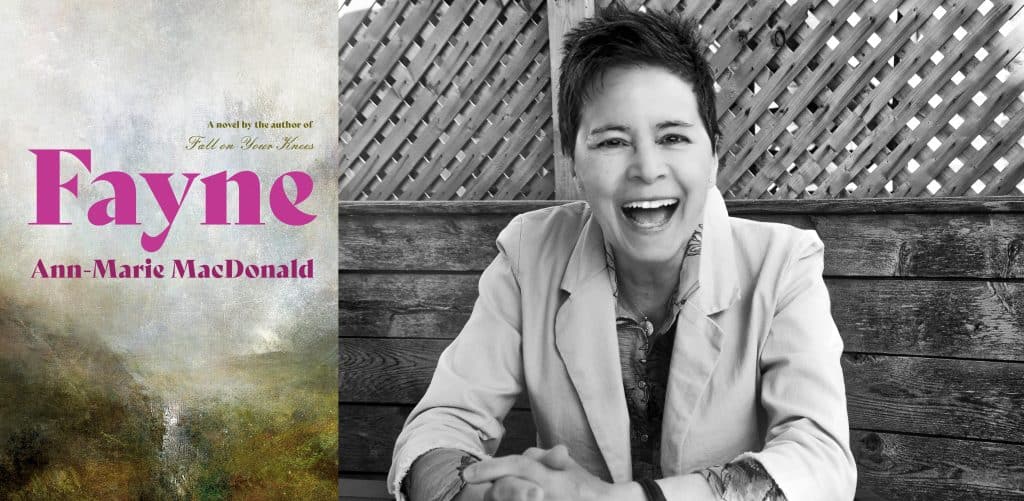

FAYNE by Ann-Marie MacDonald (Knopf Canada, 736 pages, cloth). $40. Rating: NNNNN
Fayne, award-winning author, playwright, actor, LGBTQ+ and women’s rights activist Ann-Marie MacDonald’s fourth novel, is a deeply immersive Victorian gothic tale set in the borderlands of Scotland and England. It’s an inheritor of the Brontë sisters’ atmospheric books, both Jane Eyre and Wuthering Heights, and also of Virginia Woolf’s gender-fluid Orlando.
In a “Dear Reader” address before the story begins, MacDonald explains, “It began the way all my books and plays have, with an image. This time, it was of a mysterious brooding landscape: a windswept moor… Then I drew a picture – literally… a young person in romantic nineteenth-century garb. I couldn’t tell if it was a young man or a young woman. Then I wrote down a caption: ‘I had heard something out on the fen.’”
That early vision was followed by many months of research at Montreal’s Osler Library of the History of Medicine, where she was drawn to the implements and methods of 19th-century gynecology, a profession and its details essential to her central characters. Stomping about on the rugged Scottish moorland in the care of a local guide who guarded her footsteps also fed MacDonald’s lush imagination, right down to the coconut scent of the plentiful sun-coloured gorse that lifts from the pages.
This captivating coming-of-age story of the fiery, insatiably curious adolescent protagonist Charlotte Bell – surely an amalgam of Charlotte Brontë and her male nom de plume Currer Bell – has the narrative drive of a thriller at the heart of which lie closely guarded family secrets. Charlotte, herself an enigma, justifies her isolation on the family estate (the titular Fayne) in the company of her loving widowed father Lord Henry and their servants by what she’s been told: “I understood my Condition thus: I was morbidly susceptible to germs.”
It is Fall 1887 and Charlotte, a sponge for learning, receives the unconventional and welcome gift of a tutor for her twelfth birthday. Until then she contents herself by memorizing a dictionary, creating a taxidermized chimera with her doting, bird-obsessed father, learning the old healing ways of the land from property overseer Byrn and the way of the world from her beloved nurse Knox. But now, what was once her playground – the mystical moor – becomes her classroom. Her tutor, Mr. Margalo, marvels at Charlotte’s agile mind, as she commits the scientific Table of Elements to memory in one look, shrugging, “I read, I retain. ‘Tis no strain to me.”
Excited by learning, she tells her father, “The brightest star is no more than a dead sun.” Without missing a beat in genuine paternal affection, he replies, “And, you, my dear, are the light of my life.” Soon it becomes Charlotte’s dream to study medicine at Edinburgh University, especially when she understands the possibility of a career for a woman after discovering the work of pioneering women scientists like Mary Somerville, Mary Anning and Ada Lovelace.
When Charlotte begins menstruating it seems everything turns upside down. Her distant paternal aunt, Clarissa, sends her a bespoke dressmaker’s dummy, intended to help groom her niece as a proper young lady. When Charlotte balks, telling her father, “I do not wish to be a lady,” he admits, “I cannot blame you. I myself should fail miserably at it.” When the local vicar’s daughter, Gwendolyn Haas, is invited to Fayne to help Charlotte navigate the hormonal, murky terrain of being a young woman of status, the two find in each other true friendship. Yet, when told by Gwendolyn she must plan to marry, Charlotte retorts, “I know no such thing. I’d rather discover a comet.”
Time and again, MacDonald pushes up against the notion of how painful it can be to have expectations forced upon you that go against your sense of self.
Through a narrative shift to the early 1870s, we learn that Charlotte’s mother, Marie Corcoran, an Irish American heiress, is responsible for financially shoring up the crumbling estate to which her husband is the apparent heir. And because of letters that exist between Marie and her best friend Taffy in Boston, we also discover that she suffers miscarriages and a stillbirth before delivering Charlotte’s older brother Charles, dead himself when only a toddler. As a result of her acute losses, Lady Marie is institutionalized for hysteria at Morecombe Downs, a posh rest cure that includes nature walks and talking through her sadness.
A master of her craft, MacDonald hints at truths and sometimes misleads by misdirecting or withholding, in step with her memorable characters in what she calls her queerest book yet. Follow the chimera, a missing photo, a cloak dredged from the bog, a purloined steam ticket, and a false bottomed bed and you will begin to see how the narrative threads weave together into a magnificent, meaningful tapestry.
Although set in the late 19th-century, the themes and issues she explores feel contemporary, timeless even: addiction, betrayal, belonging, identity, love, social justice, women’s rights.
Recently during an on-stage interview MacDonald said that she believes that “our relationship with art is a conversation within ourselves, and with each other.”
Lose yourself in the tale of Fayne. And find yourself in its telling.
Janet Somerville is the author of Yours, For Probably Always: Martha Gellhorn’s Letters Of Love & War 1930-1949, available now in audio, read by Tony Award-winning Ellen Barkin.












